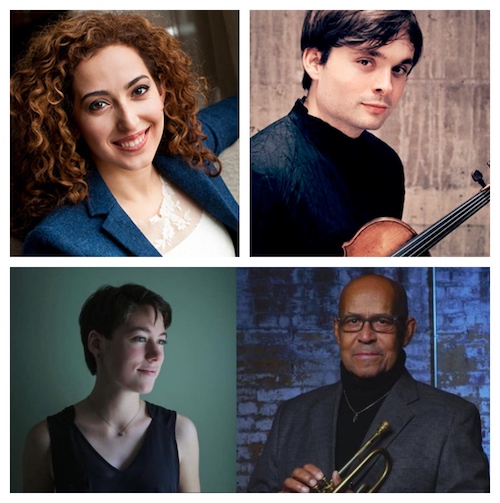by Jarrett Hoffman

•Today’s schedule: etudes for solo piano, an early-music send-off to Carnegie Hall, works for organ and viola by Black composers, and jazz voice & trumpet
•Today’s reading: Amherst Early Music and Oberlin BPI compared and contrasted, the Ukrainian Contemporary Music Festival, and a heckler at the Met
•Today’s (meta) almanac: a look back at the early days of our Diary
ON THE CALENDAR:
The itinerary begins at noon with pianist Sara Daneshpour in etudes by Chopin and Ligeti at Church of the Covenant. Then at 7:30 pm, Apollo’s Fire will take the stage at the Bath Church in Akron for music by Bach and Vivaldi before the ensemble heads to NYC’s Carnegie Hall on Thursday.
At that same hour, an Oberlin faculty recital at Finney Chapel will feature organist Christa Rakich and violist Chris Jenkins in solo music and duos by Adolphus Hailstork, William Grant Still, Florence Price, Billy Strayhorn, and David Hurd.
Finally, at 8:00 pm trumpeter Eddie Henderson joins vocalist Céline Iris and co. at the Bop Stop in a program including jazz standards and repertoire that gives a nod to Henderson’s impressive career.
Note that three of those events — Covenant, Oberlin, and Bop Stop — will also be livestreamed. See our Concert Listings for details and links.
INTERESTING READS:
An article in Early Music America compares and contrasts Amherst Early Music and the Oberlin Baroque Performance Institute. “These two programs, similar in many regards, serve a range of abilities and interests, and both of them got their start a half a century ago,” writes Daniel Hathaway, who also recounts his experience one summer reporting on BPI from within, as a harpsichord student.
The third edition of the Ukrainian Contemporary Music Festival, which took place this past weekend in New York City, was planned before the onset of war with Russia. But as Joshua Barone and Zachary Woolfe write in The New York Times, “…the war loomed over these performances: Some artists couldn’t leave Ukraine, and the concerts were adapted to accommodate their absences. And the festival’s very existence has always been a rejection of President Vladimir V. Putin of Russia’s assertion that there is no real Ukrainian culture.”
And an audience member has been banned from the Metropolitan Opera after heckling a soprano following her aria during Richard Strauss’s Ariadne auf Naxos on March 17. An article by Francisco Salazar for Opera Wire includes statements from a colleague of the performer, from the Met, and from a publicist, who writes, “…reaching a certain level of fame or prestige does not automatically equip an artist with an indestructibly thick skin. They do not hand out a Valkyrie shield with each Met ID.”
TODAY’S (META) ALMANAC:
We recently passed the two-year anniversary of the birth of ClevelandClassical.com’s Diary entries. Conceived shortly after the start of the pandemic, the series is a collection of all sorts of things: breaking news, calendar changes, interesting articles, little FYI’s, historical musings, opinion pieces, you name it — a way to respond to a world and a musical ecosystem that have been quickly and constantly changing.
According to the entry on this date two years ago, the schedule of events for the day consisted of two streams, one of which was archival. Even the latter was not the type of thing to be taken lightly at the time, as we all know.
Which brings us to today, a busy Tuesday full of live performances and livestreams alike. And again, just like two years ago, something to make us all feel grateful, myself included.



